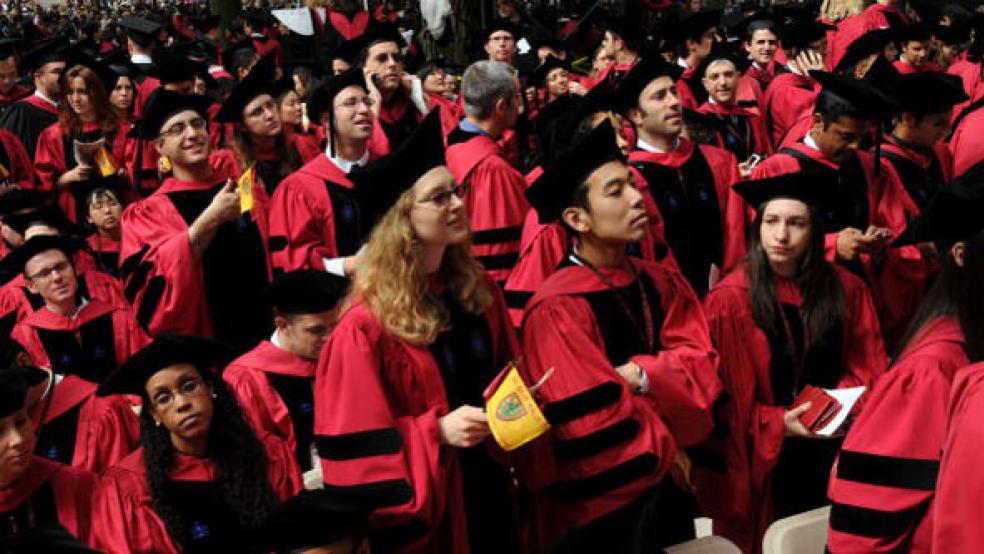As millions of American high school seniors apply to college, how many will be able to pay for four years when the cost of attending a private university runs as much as $40,000 to $60,000 a year?
It’s a conundrum – which Ken Ilgunas, 30, knows well.
When he graduated from the public University of Buffalo with a “useless liberal arts degree,” as he calls it, Ilgunas was $32,000 in debt with no clear way of repaying it.
RELATED: 5 WAYS TO SURVIVE THE COLLEGE TUITION HURDLE
Rather than labor for years in a low-wage job while chipping away at his mountainous debt, he made an uncommon decision – and took off for Alaska. With a hugely reduced cost of living, he worked odds jobs, lived off the land and traveled 5,500 miles across the continent, practicing frugality, Waldenesque style (and earning a few blisters).
After three years, Ilgunas had zapped his debt to zero. He then decided to get a master’s degree at Duke University, but again, he did it his way. He bought a used van for $1,500, outfitted it with the comforts of home and slashed costs by living in it. He washed clothes in a Laundromat, studied at the library and showered at the gym.
RELATED: THE ONE COLLEGE EXPENSE YOU FORGOT TO FACTOR IN
To be sure, this is not recommended, especially since Duke and other universities have banned van dwellers from campus. But the lessons learned are universal. “If I could have done college over again,” he said, “I would have traveled for a year or two first and worked or joined an AmeriCorps program in Europe or Africa. It was the experiences away from home that I craved – but I could have done it without going into terrible debt and compromising my financial future.”
The Fiscal Times spoke to Ilgunas, author of Walden on Wheels: On the Open Road from Debt to Freedom:
MM: You started out at Alfred University, a private New York college whose current annual cost of undergraduate attendance for out-of-state residents is $43,000, while in-state residents pay $32,000. Eventually you transferred to University of Buffalo, a bit cheaper. Still, you say you’d have done this differently if you could.
Ken Ilgunas (KI): Alfred was the best school I could get into as a freshman. That first year cost me $18,000 and put me into inescapable debt – and over the next four years I accumulated even more. I had the foresight to transfer to a public college near home where I could commute and save money – but I would not have gone to Alfred. After high school, I just wanted to get away. That was fine, but going to an unaffordable school was just dumb. There’s often very little difference in the quality of education at prestigious schools and schools that are not so prestigious.
RELATED: 10 SMART WAYS TO CUT COLLEGE COSTS
MM: You'd find some disagreement there – and many high school students feel pressure to attend the “right” schools to be as marketable as possible once they graduate.
KI: A lot of that is very real. But I’d say to them: You have a four- or five-year period that’s very different from the rest of your life, with opportunities to explore the world. Do whatever the hell you want for four years. Study what you want. Follow your bliss. Follow your academic curiosities. Do it without going into debt – then you can think about a career.
MM: How so? What will they have learned that’s practical?
KI: The undergrad years don’t often lead to a career. You need grad school. I think of undergrad as the foundation on which to build a career. As for pressure to go to a prestigious school – it’s ridiculous, mostly. Sure, a private school opens up better opportunities. But is it worth going $70,000 into debt versus $20,000? I don’t think so. Often it’s a school’s big brand or lavish accommodations that attract people. We should worry more about the quality of our experience and not going into terrible debt.
RELATED: 10 PUBLIC COLLEGES WITH INSANELY LUXURIOUS DORMS
MM: You’ve been living on a farm in North Carolina and writing a new book while bartering labor for room and board. How have you made that work?
KI: I’m not encumbered by a mortgage or rent like most people. I take care of chickens, gardens, orchards and fences for about two hours a day. It’s convenient. I focus on my literary endeavors.
MM: Most people couldn’t or wouldn't do it.
KI: I’m not a complete recluse or hermit – I have friends and relationships like everyone else. But I’ve been here to learn and to grow. Periods of growth often require struggle and sacrifice.
MM: At 30 years old, don’t you miss texting, Twitter, Facebook, cellphones and more?
KI: I’m not a Luddite – I have a laptop and an iPad for research and writing. It’s about finding a balance. If I had plugs in my ears all day I wouldn’t be able to work.
MM: Many parents of means today can’t help but rescue their kids from debt. Did your parents offer?
KI: My dad’s a factory worker, my mom’s a nurse – we were by no means wealthy. It was always understood my brother and I would pay our own way.
MM: So your next book is also about student debt – or rather, about getting out of it. It’s a how to.
KI: Yes. I might actually call it Get the F--- Out of Debt Now.
MM: That could be attention getting.
KI: Many 17-year-old kids are asking themselves right now: Do I want to be an ambitious, successful and well paid person – and go to a topnotch private school and wind up in enormous debt? They’re shooting for the moon. I have sympathy for that. But it’s not the only choice.






